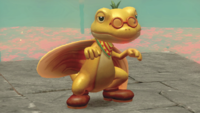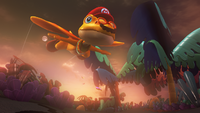Glydon
Template:Character-infobox Template:Quote2
Glydon[1][2] is a character who is enthusiastic about flying and gliding. Mario meets Glydon in several Kingdoms throughout the game Super Mario Odyssey. He states that he's travelling to various Kingdoms to glide from the highest places,[1] while the world atlas as well as his bandana having similar motifs as the ones found on the ponchos of Tostarenans indicate that his homeland is in the Sand Kingdom,[3] which is indeed the first Kingdom where he can be found in the game.[4]
Mario can take control of Glydon to glide and dive. His dive is much faster and harder to steer than his glide. While gliding, shaking the Joy-Con or Pro Controller makes the captured Glydon stay airborne longer. However, when captured, Glydon cannot swim and simply disappears as soon as he touches water.[1] On the other hand, Glydon cannot sink in quicksand; instead, he starts stomping whenever he stands on it whether he is being captured by Mario or not. A Power Moon in the Seaside Kingdom, Lighthouse Leaper, specifically requires the player to glide with Glydon from the top of the Lighthouse toward the Glass Palace and then talk to a Bubblainian near said palace.[1]
His name is a portmanteau of "glide" and "-odon", a typical suffix used for animals (often reptiles, such as Iguanodon and Pteranodon) distinguished or recognized through their teeth.
While Glydon is explicitly stated to be an individual character,[2] his name in various Western languages as well as the official PRIMA guide of Super Mario Odyssey indicate that Glydon is also the name of his species.[5]
Physical appearance

Glydon is a yellow bipedal reptile designed after flying lizards. He's taller than Mario and features a long tail, two hands with three fingers and a thumb each and two rather short legs which are typically kept significantly bent and almost resting on the coronal plane, resulting in a very peculiar walking gait. He also has two giant membranes on his sides, the patagia, that he uses for gliding and are reddish-orange in color, with various visible veinings on the inside, while the outside is red into orange on the tip, featuring irregular yellow stripes. The rest of his skin is mostly yellow with faintly visible scales, bar the back which features small orange stripes, the lower part of his body and from the lower part of the muzzle up to the tip of his tail, which is fully white and doesn't feature scales. His head features three short dark green hairs on the tip and eyes which are at the side and slightly protruding from the head. Said eyes have big black pupils surrounded by small light orange irises and a white sclera, as well as yellow eyelids that he typically keeps slightly lowered until he has been captured by Mario. The upper tip of his muzzle features two small nostrils while the mouth itself is toothless and only features a red rounded tongue. He wears small round red spectales on the tip of his muzzle, reddish brown shoes with beige outsoles, similar to those worn by Yoshis, and a bandana with alternating yellow and red stripes that end with yellow and red triangles and an outline formed by a green strip followed by a white strip.
Gallery
Artwork
- SMO Secret Ending Postcard.jpeg
Postcard obtained as reward in Super Mario Odyssey
Screenshots
Glydon meeting Mario in the Sand Kingdom
Glydon captured by Mario diving in the Wooded Kingdom
- SMO Glydon screenshot.png
Glydon in the Seaside Kingdom
Glydon with Mario in the Lost Kingdom
Names in other languages
| Language | Name | Meaning |
|---|---|---|
| Japanese | カックー[6] Kakkū |
From 「滑空」, kakkū, which means "gliding". |
| Chinese | 滑翔小子 Huáxiáng xiǎozi |
Glide Boy |
| Dutch | Glydon[9] |
- |
| German | Segelmander[10] |
Portmanteau of segeln (to glide) and Salamander. |
| Italian | Planosauro[11] |
From planata (glide) and -sauro (lizard). |
| Russian | Птеродон[12] Pterodon |
From Птер-, the Russian transcription of the Greek πτερ- (wing), and -одон, the Russian transcription of the Greek -όδων (tooth). |
| Spanish | Planeosaurio[7] |
From planeo (glide) and -saurio (lizard). |
References
- ^ a b c d Nintendo Life (September 20, 2017). New Character Glydon in Super Mario Odyssey for Switch. YouTube. Retrieved October 5, 2017.
- ^ a b Post about Glydon from the official UK and Irish Twitter account of Super Mario.
- ^ Current World atlas of Super Mario Odyssey.
- ^ GamesMundo GAMER WordGames GAMER (October 26, 2017). Super Mario Odyssey Gameplay completo Part 2 Sand Kingdom 100%. YouTube. Retrieved October 27, 2017.
- ^ Super Mario Odyssey Prima eGuide
- ^ Post about Glydon from the official Japanese Twitter account of Super Mario Odyssey.
- ^ Post about Glydon from the official Spanish Twitter account of Super Mario.
- ^ Post about Glydon from the official French Twitter account of Super Mario.
- ^ Post about Glydon from the official Dutch Twitter account of Super Mario.
- ^ Post about Glydon from the official German Twitter account of Super Mario.
- ^ Post about Glydon from the official Italian Twitter account of Super Mario.
- ^ Post about Glydon from the official Russian Twitter account of Super Mario.




